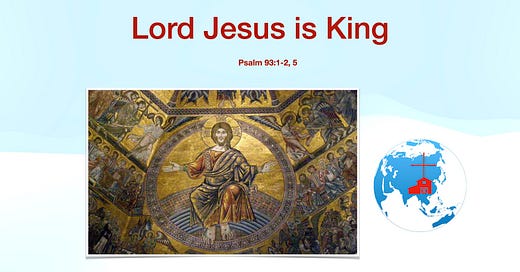Psalm 93:1-2, 5
The psalm's opening phrase announces the theme of the reign of the Lord. The description of the Lord clothed with splendour and power reminds me of the description of the risen Christ in the book of Revelation. John describes our risen Lord as “clothed with a long robe and with a golden sash around his chest. The hairs of his head were white, like white wool, like snow. His eyes were like a flame of fire, his feet were like burnished bronze, refined in a furnace, and his voice was like the roar of many waters” (Rev 1:13-15). The vision was so overwhelming that John fell at Christ’s feet as “though dead” (Rev 1:17).
After describing the Lord clothed with splendour and power, the psalmist declares that our God is “ from everlasting to everlasting” (Ps 90:2). The New Testament deepens this truth. In his dispute with the Judeans, Jesus said, “before Abraham was, I am” (John 8:58). This statement reveals His everlasting existence before and beyond time and space. The psalmist also states that the Lord created the universe. The authors of the New Testament explain that everything that exists was created by the Lord through his everlasting Word that became flesh (see John 1:1-3; Col 1:15-16).
The psalmist then speaks about God’s throne “that stands firm from of old” (Ps 93:2). This statement again brings me to the book of Revelation and the vision of heaven. John saw there a throne with “a rainbow that had the appearance of an emerald” around it (see Rev 4:2-3). But, the one who seated on it could only be described as having “the appearance of jasper and carnelian” (Rev 4:3). Our God cannot be described. He surpasses what we could ever think of or imagine.
Then, the psalmist speaks about God’s decrees as worthy of trust (Ps 93:5). At the centre of all God’s laws the Bible places the Ten Commandments (see Ex 20:1-17; Deut 5:1-21). They regulate our relationship with God and our neighbour. Jesus summarised their requirements in the two commandments of love. The Ten Commandments remain valid and “no one can dispense from them” (CCC, 2072). They are the signpost in our journey of life that leads us to holiness that befits God’s house, the Church.
In Catholic liturgy, this psalm is used on the Solemnity of Christ the King to proclaim the truth that Jesus Christ is the King of the universe. He is from everlasting, born of the Father before all ages. Everything was created in him, through him, and for him (see Col 1:16). He clothed himself with majesty when he rose from the grave and he reigns from his firm throne in heaven. Jesus’ teaching is worthy of trust because his words are “spirit and life” (John 6:63). And He established his house, the one, holy, universal, and apostolic Church to celebrate God’s splendour and majesty in liturgy and to spread the Gospel of salvation to everyone in the world.




